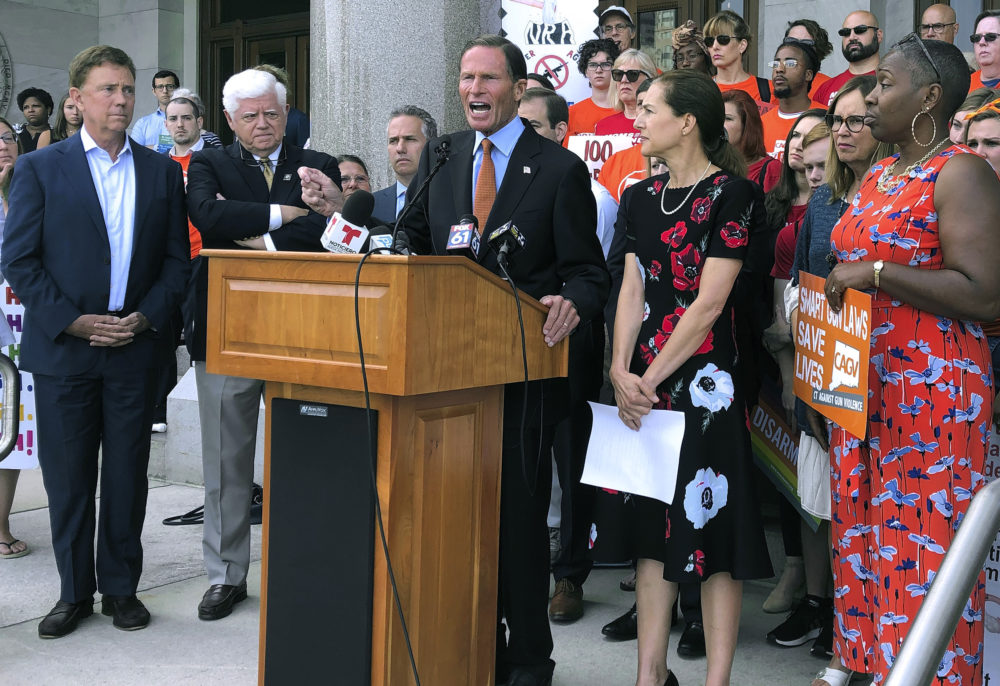Advertisement
Sen. Richard Blumenthal: 'We're Very, Very Close' On Red-Flag Legislation

Sen. Richard Blumenthal said Tuesday that he and Senate Judiciary Committee Chairman Lindsey Graham are "very, very close" to introducing "red flag" legislation to curb gun violence.
The bipartisan bill would assist states in adopting red flag laws by creating a federal grant program. The grants would go to law enforcement "so they can hire and consult with mental health professionals to better determine which cases need to be acted upon," Graham, R-S.C., said in a statement.
"We are working through some of the final language on a measure that essentially would provide grants and incentives to states to follow the lead of Connecticut and 16 other states that already have these statutes on their books," Blumenthal, D-Conn., told CBS News' Nancy Cordes during Tuesday's On Point broadcast. "And, by the way, they are working to save lives, because they enable law enforcement officers and others to go to court get a warrant, much like a search warrant or an arrest warrant, showing that there are facts, that a person is dangerous to himself or herself or others."
Red flag laws, broadly, are "ones that allow family members or law enforcement to petition a judge to temporarily remove guns from a person who is seen to be a risk to themselves or others."
We’ve heard the calls to curb gun violence before. After the most recent wave of mass shootings, gun control is back on the table. And there are some surprising new converts to the cause. But is there enough momentum for Congress to get something done when it returns next month? And are lawmakers focusing on the most effective ways to prevent shootings?
Interview Highlights
How this red flag legislation could help curb gun violence
Blumenthal: "That means, for example, a domestic dispute situation, where an estranged husband or an intimate partner is about to kill somebody. It means a suicide threat. It means a threat of a mass shooting, where a judge — as in Parkland — could have stopped, very likely, if the FBI had this resource at the time. Florida since passed such a statute. And then, there is due process, a review period, where there can be a hearing, and if there is a mistake in the presentation of alleged facts the order can be withdrawn. So there is due process, fairness, to everyone. But saving lives is so important, by keeping guns out of the hands of people who are dangerous to themselves or others. That's the basic principle.
"And I think it has to be part of a comprehensive solution here. Alone, it may be important, but it's completely insufficient. We do need background checks, we need safe storage laws, a ban on assault weapons and high capacity magazines, and better research, and eliminating the sweetheart deal that gives immunity to gun manufacturers."
"Saving lives is so important, by keeping guns out of the hands of people who are dangerous to themselves or others. That's the basic principle."
Sen. Richard Blumenthal, D-Conn.
Red flag laws around the country differ. What kind of red flag laws would this federal program stipulate?
"There is more in common, among these red flag statutes in those 17 states, than there are differences. There are slight variations in the burden of proof. I'm a former trial lawyer and a prosecutor for most my career, so I could spend the rest of the day talking about those differences. But there is a lot of commonality in the factual showing that has to be made to take a gun away.
"There may be differences in the time period for the next hearing, the due process hearing — a week, three weeks — but what is needed is more education about how the process can and should work, education for law enforcement about how they can use this statute, how they can react to threats like the shooter in Parkland, who called the FBI, called the local police, and they were, in a sense, powerless to take that gun away because they had no red flag statute. And making use of it so that it is used more commonly, and fairly, and effectively.
"In Connecticut, let's just take this brief history. Our statute was the first that was adopted after a 1999 mass shooting, and in the first year it was used relatively infrequently. Now it's used more than 200 times a year. Just within the past week, it has been used twice when there was a threat of a mass shooting. But it's also used in cases of suicide, where mental health is part of the solution. And in a very substantial number of cases, again with the right education and training, judges can say to the individual who's threatened to kill himself or others, 'Before you get your gun back, maybe you should talk to somebody with professional training about why you feel so angry.' Using the statute in an intelligent effective way is very important."
Advertisement
"We do need background checks, we need safe storage laws, a ban on assault weapons and high capacity magazines, and better research, and eliminating the sweetheart deal that gives immunity to gun manufacturers."
Sen. Richard Blumenthal, D-Conn.
On the effectiveness of red flag laws
Some stats, pertaining to Connecticut's 1999 red flag law, per a June 2018 study in Psychiatric Services: "Connecticut's gun-related suicide rate dropped 1.6% in the first few years after its law passed in 1999, relative to what would have been expected without it. But the drop was more pronounced — 13.7% — from 2007, when Connecticut authorities started using the law more often — to 2015."
"I'm a law enforcement guy, and I think that the best laws are dead letter if they're not enforced effectively and intelligently. So just putting the law on the books is not the answer. Law enforcement has to be trained and they have to have the will as well the capacity.
"And we've seen increasing use of them in Connecticut now, whether it's 1.6% or 10% or 30%. If we save one life, it's a major accomplishment. And these red flag, or emergency risk protection orders, are not the answer to suicide alone. Mental health and greater availability of treatment is absolutely essential. And it has to work in combination with making the guns less available, as in background checks and use of protective orders. So we're talking about a step, an important step, and in my view, a necessary step."
On President Trump's position at this point in time
"I can speak only for myself, which is, I am determined to work as hard and long as possible. I have no way of knowing what is happening inside the president's head. I'll believe that when I see it, if he says he's for greater measures to assure gun safet — he's backtracked a little bit over the weekend. But I do believe that Lindsey Graham is here, and he's been a great partner in this effort to try to achieve bipartisan support for an emergency risk protection order statute."

